Welcome to Matrix Education
To ensure we are showing you the most relevant content, please select your location below.
Select a year to see courses
Learn online or on-campus during the term or school holidays
Learn online or on-campus during the term or school holidays
Learn online or on-campus during the term or school holidays
Learn online or on-campus during the term or school holidays
Learn online or on-campus during the term or school holidays
Learn online or on-campus during the term or school holidays
Learn online or on-campus during the term or school holidays
Get HSC exam ready in just a week
Select a year to see available courses
Science guides to help you get ahead
Science guides to help you get ahead
Penelope explains her best exam preparation techniques in this article to help you feel confident and ready for your next assessments.
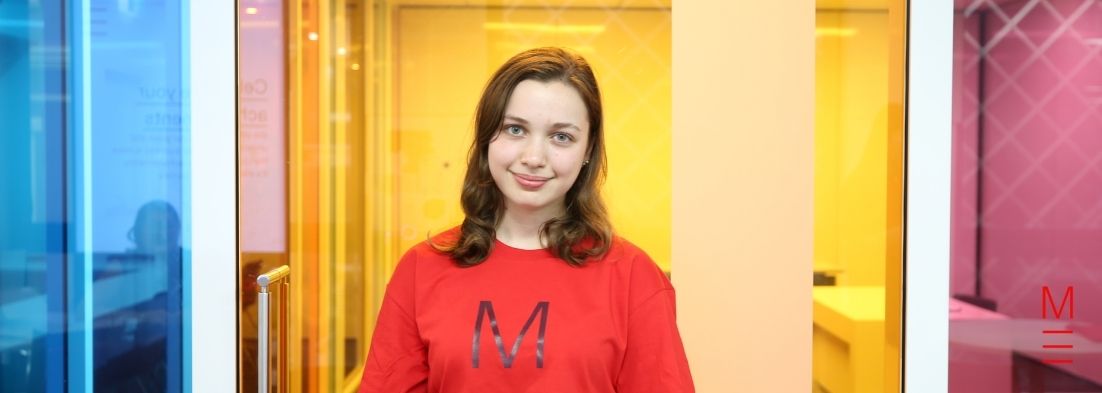
Join 75,893 students who already have a head start.
"*" indicates required fields
You might also like

Join 8000+ students each term who already have a head start for English, Maths, OC/Selective Prep, Science, Biology, Chemistry or Physics.
Do you procrastinate and then cram? In this article, Matrix Scholarship student Penelope Lukes shares her hacks to avoid last-minute cramming!
Name: Penelope Lukes
School: Sydney Girls High School
Grade: 12
ATAR goal: 98+
University goal: Textile Engineering, preferably an interstate scholarship!
My name is Penelope, and I attend Sydney Girls High School. I’m passionate about STEM and the emergence of women in STEM occupations, and creative pursuits, particularly sewing and other handcrafts. This may seem like a bit of a weird mix of traditionalism and new-wave interests, but I love the way these two passions intersect.
I am also very passionate about social and environmental issues, like climate change and slave labour, particularly within the textiles and fast fashion industry. I want to study Textile Engineering. This pursuit allows me to combine my love for Textiles and Design with my aspiration to use engineering to solve global problems, such as researching the development of a new textile for commercial use that can curb the environmental impacts of clothing manufacture.
I am currently taking:
In addition to my academic pursuits at school, I pursue hobbies and physical activity outside of school. I have been dancing since I was a child and recently picked up yoga with my mum. Additionally, I play the flute and continue to take lessons. I also love to read, draw, and create. Maintaining hobbies is endlessly beneficial, giving me space to clear my head and giving me mandatory time away from homework and studying.
I’m continuing with almost all of my subjects going into Year 12. I’m starting the year with 12 units, picking up Mathematics Extension 2 and dropping English Extension 1. I’ve found I really enjoy senior Mathematics, and I am eager to pursue a higher level. I chose to drop English Extension 1 because I believe my strengths and passions lie more in Mathematics than English.
I find Mathematics so fascinating! Especially in higher grades, it is fulfilling to watch all the things you have learnt over the past 6 years re-emerge at a higher level of application. I also find that the structured nature of maths and its predictable homework patterns assist me in managing my time.
The most appealing thing about Economics to me is its real-world applications. Especially amongst the current COVID-19 crisis, learning Economics has been a unique and interesting experience allowing me to combine classwork with the real-world issues Australia and the rest of the world are facing. My passions for social and political issues are fostered through learning and understanding economic theory.
As well as theoretical learning, I excel at hands-on applications of knowledge, and find that I learn best when I can apply the things I have learnt. I am super interested in both the design and practical applications of textiles technology. In Textiles, I can disconnect from the traditional academic rigour of school and really tap into my creativity, and I can create things I’m truly proud of.
Especially due to the COVID-19 lockdown, I was self-teaching most of the Chemistry syllabus. As Chemistry is a content-heavy and complex subject, this led to gaps in my knowledge and grades that were lower than I would have liked. However, I was determined to improve!
I’ve improved by communicating with friends and teachers to ask for help and resources, finding and completing many practice questions and by attending Matrix Chemistry in Term 3, an invaluable resource in improving my confidence with Chemistry.
I found that this proactive mindset not only improved my abilities but changed my perspective and renewed my passion for Chemistry, making me feel a lot more positive about continuing it into Year 12.
Conceptually, I find English the hardest subject to understand. As a lot of the theory is quite abstract, and there are many ways to approach answering questions, I often feel overwhelmed.
Additionally, my perfectionism and impostor syndrome often get in the way of me completing English tasks efficiently and positively. No matter my end mark, I always finish in-class assessments feeling that I didn’t do my best.
I know that practice and feedback is key to improving, so I’m now seeking help from my teacher in order to better grasp where I am falling short.
To feel more confident in English, I’m writing my notes earlier and taking more comprehensive notes in class so I can proceed to completing practice responses well in advance of any exams. This way, I’ll feel much more confident in the exam.
Try Matrix for free!
Experience the Matrix advantage for yourself, risk-free. Book a free trial and join a class!
I try to anticipate exams before I even receive a notification of assessment! When I get home from school, I always complete tasks in terms of priority, allowing myself free time in the evenings after I have completed the tasks and homework for that day.
I always do homework first.
Many people seem to neglect homework when they know there are exams coming up, but usually this homework will relate to the content assessed in the exam (such as set exercises for Mathematics), so completing it is revision in itself.
Once I have completed homework, I begin exam preparation.
My digital notes, a combination of summarized syllabus material and additional in-class information written throughout the term, are my first point of reference. This extra info might be relevant real-world news articles (Economics), practical tasks completed in class (Chemistry) or key quotes or discussion points (English).
I am also a Quizlet devotee! For Chemistry, Textiles and Economics, I make a Quizlet with terms and definitions for every topic. Making the Quizlet helps me revise the key terms, and closer to the exam I can revisit it to refresh myself.
Furthermore, I find I absorb information effectively if I hand-write additional notes for content-heavy subjects. For Economics and Chemistry, I always hand-write notes from my digital notes, further summarizing the information.
Practice resources are also key in revision. These can include textbook questions and chapter or topic reviews, school-provided past papers and questions and online worksheets and resources (just Google your subject and topic – there’s a lot to find!). NESA has a particularly useful multiple-choice generator for almost all HSC subjects that pulls questions from past papers and collates them into a randomly generated, timed online quiz.
My study scaffold looks a little like this:
Come home and type up notes after each lesson for each subject. If I find I fall behind, I always catch up on the weekend! At the end of the topic, I come home and make a Quizlet.
I schedule out the next few weeks to ensure I stay on task and revise comprehensively, making a revision timetable.
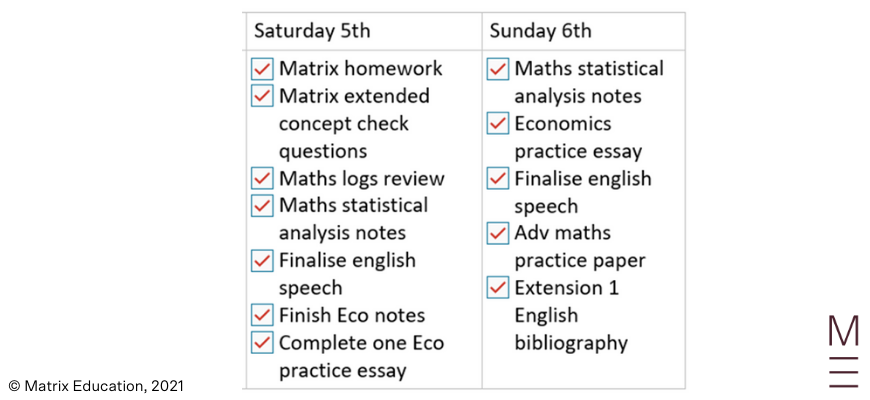
The first thing I do is hand-write my notes, revisiting the topics I learnt longest ago first. Next, I begin practising. For Chemistry, Economics, Textiles and Mathematics, I go back to the textbook questions and chapter reviews first. For English, I revisit any handwritten practice responses from class and retry the questions.
I begin by completing untimed past papers. Then, I begin doing past papers or questions under timed conditions and mark them afterwards. If I notice any holes in my knowledge, I address these.
Otherwise, practice makes perfect!
I find practice questions and papers the best way to improve quickly. If I prepare like this, I feel completely confident a couple days before the exam.
While the day before an exam is often full of stress, I always try to put the books down by 7pm. This leaves my brain space to wind down so I can get a good night’s sleep prior to the exam.
Firstly, always read the text. Not only does it go way more in-depth than any SparkNotes summary, reading is the best way to improve your writing. Even if the text is hard to read (some of them can be – Thomas More’s Utopia was quite a trek), I get into the mindset that my creative and analytical writing will ultimately be enhanced by reading the text.
For me, the best way I learn in English is by listening to and participating in class discussions.
I write down what others say, what the teacher says and any other interesting discussion points from class. I also try to annotate the text as I go, whether this is writing directly onto the book (our school Shakespeare copies are covered in notes!), using post-it tags, or collating quotes into a document. This way, I have quotes and analysis ready to go for preparation for a hand-in or in-class assessment.
Finally: practice, practice, practice. I complete any practice responses given by the teacher and get feedback where possible. I also always ensure I have a network of friends I can go to for peer reviews. As well as being able to get useful feedback from my friends, I can hone my own critical reading skills and gain alternative perspectives on the text by closely critiquing my friends’ work.
The keys for Maths success for me are clarification, perseverance, and practice.
Firstly, I always clarify! Especially in Extension 1, the concepts are hard to grasp quickly. However, asking questions helps smooth over bumps before they emerge in earnest. The next lesson after a particularly hard topic I often have questions from the homework too.
Don’t be afraid to ask friends and teachers for help, as this is often the best way to learn!
No matter what, I persevere. I always do Maths homework as soon as I get home and keep a record of questions I couldn’t do so I can go back to them later. If I’m stuck, I take a break and move onto other tasks, as otherwise I get easily frustrated. I always come back later to give it another go: I know mastery will come in time, nobody is perfect at first!
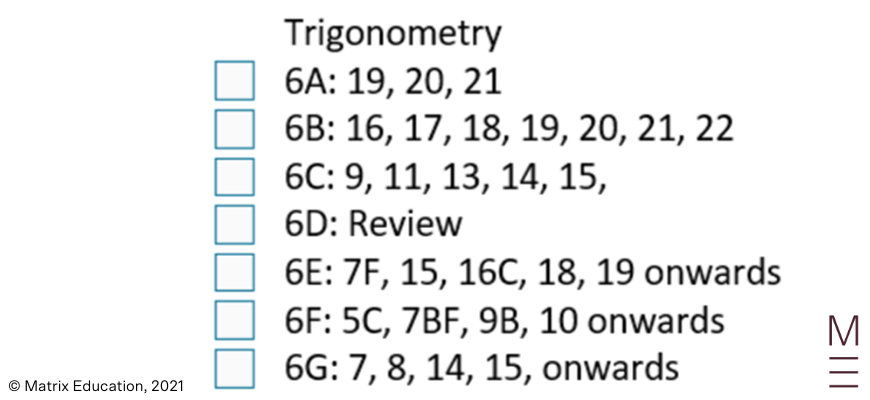
Finally, I practice! This could be completing the homework, re-attempting difficult questions, chapter reviews, other online resources, and timed past papers. As well, for particularly hard topics I make handwritten notes and include written solutions to particularly difficult questions or questions I got wrong in a previous exam. I will practice for every topic until I feel confident – I trust my intuition to tell me when I feel prepared.
Sometimes I receive an Economics assessment notification and ask myself, “Where do I even begin?”
With Economics, the key to effective studying is mastering theory AND integrating real-life examples.
While the textbook gives a complete explanation of concepts, it can be long-winded. So, when mastering theory with the textbook, cross-check with the syllabus – maybe that paragraph on George Calombaris’ underpaid workers isn’t going to really help you write that extended response. If you feel that the textbook doesn’t elaborate enough, sources like Investopedia, Khan Academy and Crash Course help supplement your knowledge. Additionally, I always include relevant flowcharts or diagrams in my notes so I can recreate them in an exam.
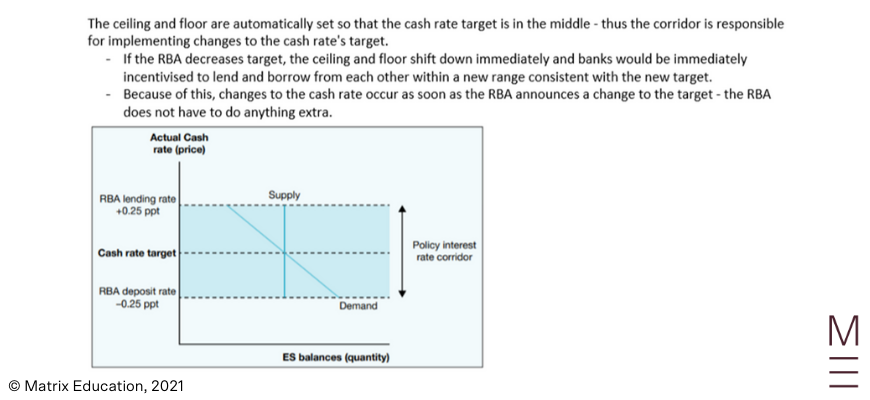
It is also important to stay up to date on current events. Sources like The Guardian, The Sydney Morning Herald and the ABC are my favourite for news and opinion pieces on our economy. I also use the RBA and the Australian Bureau of Statistics websites for further elaboration. I keep a list of statistics constantly updated:
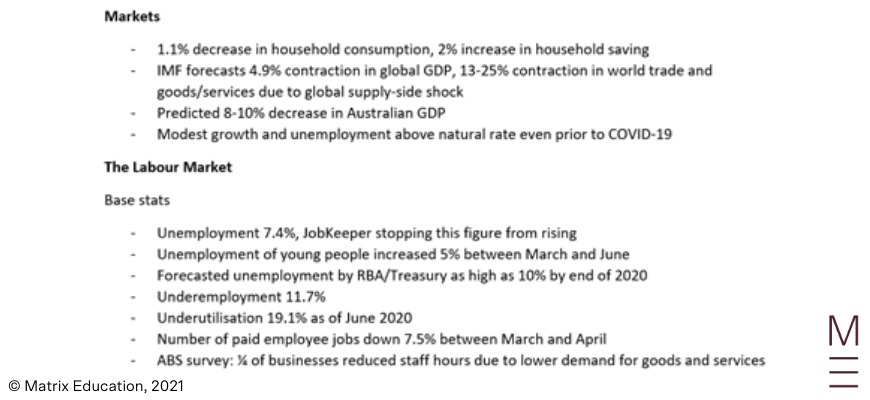
Additionally, I record any interesting news articles to draw quotes from in preparation for extended responses.

To be honest, I hated maths last year. I wasn’t very good at it; I didn’t enjoy learning it and I was very pessimistic. And predictably, I didn’t do too great. This year, I realised it was time to make a change.
A new class, new structure to learning and new, advanced concepts provoked me to give it my best shot.
Now I’m performing the best I’ve ever performed in Maths, and I feel more confident than ever before. For anyone out there feeling similarly, a change of mindset can really break down barriers.
COVID-19 brought with it so much free time, and as a result, I felt myself slip into the old, lethargic state of overworking myself that I was so determined to abandon at the start of 2020.
However, as soon as I became conscious of this, I made a change, dedicating time in each day to the pursuit of other hobbies.
Suddenly I felt more motivated, less lethargic and I actually ended up performing better!
I have to admit, I’m a massive perfectionist. In previous years, one bad mark would throw my entire mindset off and I’d be upset for days at a time over it.
This year I realised there was no room for that upset anymore.
Even though I’ve been disappointed a couple of times this year, I can recognise now that mistakes are part of the learning process. Plus, it’s better to make those mistakes and learn from them as early as you can.
I wish I had got out of my comfort zone a little more this year. Particularly, I wish I could have picked up a new team sport (although the circumstances made that a little hard to do), and if not that, then tried an individual hobby I’d never done before. Unfortunately, that didn’t really work out and I stuck with what I knew. While I improved at these hobbies, I still really wish I had done something new!
We were all super reliant on social media during quarantine as our only tether to our friends and the world. Consequently, I know that I along with many people around me were using our phones a lot more.
Even as quarantine ended, I felt this habit was a little hard to break, sometimes negatively impacting self-esteem and productivity. So, I wish I had taken more time to ‘switch off’ and stay away from my phone as I think it would have positively impacted my emotional wellbeing and my productivity.
Written by Guest Author
We have regular contributions to our blog from our Tutor Team and high performing Matrix Students. Come back regularly for these guest posts to learn their study hacks and insights!© Matrix Education and www.matrix.edu.au, 2023. Unauthorised use and/or duplication of this material without express and written permission from this site’s author and/or owner is strictly prohibited. Excerpts and links may be used, provided that full and clear credit is given to Matrix Education and www.matrix.edu.au with appropriate and specific direction to the original content.